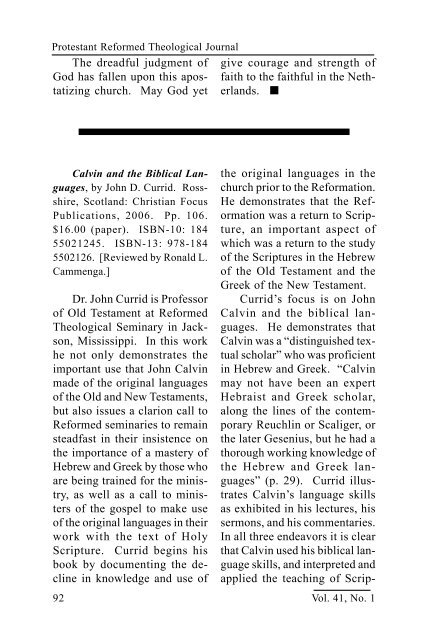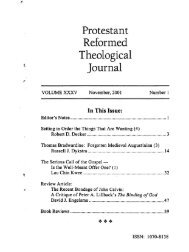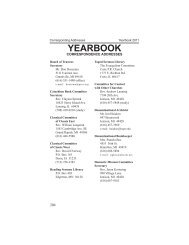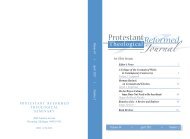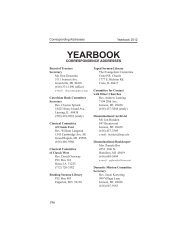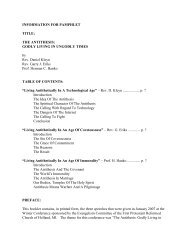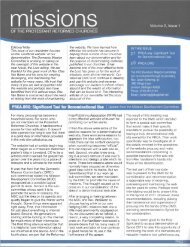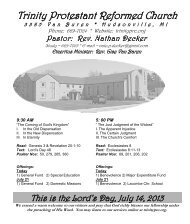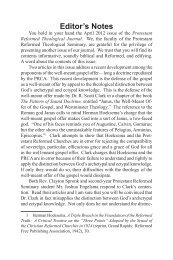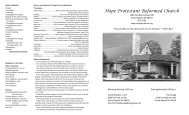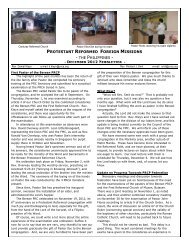November 2007 - Protestant Reformed Churches in America
November 2007 - Protestant Reformed Churches in America
November 2007 - Protestant Reformed Churches in America
Create successful ePaper yourself
Turn your PDF publications into a flip-book with our unique Google optimized e-Paper software.
<strong>Protestant</strong> <strong>Reformed</strong> Theological Journal<br />
The dreadful judgment of give courage and strength of<br />
God has fallen upon this apostatiz<strong>in</strong>g<br />
faith to the faithful <strong>in</strong> the Neth-<br />
church. May God yet erlands.<br />
■<br />
Calv<strong>in</strong> and the Biblical Languages,<br />
by John D. Currid. Rossshire,<br />
Scotland: Christian Focus<br />
Publications, 2006. Pp. 106.<br />
$16.00 (paper). ISBN-10: 184<br />
55021245. ISBN-13: 978-184<br />
5502126. [Reviewed by Ronald L.<br />
Cammenga.]<br />
Dr. John Currid is Professor<br />
of Old Testament at <strong>Reformed</strong><br />
Theological Sem<strong>in</strong>ary <strong>in</strong> Jackson,<br />
Mississippi. In this work<br />
he not only demonstrates the<br />
important use that John Calv<strong>in</strong><br />
made of the orig<strong>in</strong>al languages<br />
of the Old and New Testaments,<br />
but also issues a clarion call to<br />
<strong>Reformed</strong> sem<strong>in</strong>aries to rema<strong>in</strong><br />
steadfast <strong>in</strong> their <strong>in</strong>sistence on<br />
the importance of a mastery of<br />
Hebrew and Greek by those who<br />
are be<strong>in</strong>g tra<strong>in</strong>ed for the m<strong>in</strong>istry,<br />
as well as a call to m<strong>in</strong>isters<br />
of the gospel to make use<br />
of the orig<strong>in</strong>al languages <strong>in</strong> their<br />
work with the text of Holy<br />
Scripture. Currid beg<strong>in</strong>s his<br />
book by document<strong>in</strong>g the decl<strong>in</strong>e<br />
<strong>in</strong> knowledge and use of<br />
92<br />
the orig<strong>in</strong>al languages <strong>in</strong> the<br />
church prior to the Reformation.<br />
He demonstrates that the Reformation<br />
was a return to Scripture,<br />
an important aspect of<br />
which was a return to the study<br />
of the Scriptures <strong>in</strong> the Hebrew<br />
of the Old Testament and the<br />
Greek of the New Testament.<br />
Currid’s focus is on John<br />
Calv<strong>in</strong> and the biblical languages.<br />
He demonstrates that<br />
Calv<strong>in</strong> was a “dist<strong>in</strong>guished textual<br />
scholar” who was proficient<br />
<strong>in</strong> Hebrew and Greek. “Calv<strong>in</strong><br />
may not have been an expert<br />
Hebraist and Greek scholar,<br />
along the l<strong>in</strong>es of the contemporary<br />
Reuchl<strong>in</strong> or Scaliger, or<br />
the later Gesenius, but he had a<br />
thorough work<strong>in</strong>g knowledge of<br />
the Hebrew and Greek languages”<br />
(p. 29). Currid illustrates<br />
Calv<strong>in</strong>’s language skills<br />
as exhibited <strong>in</strong> his lectures, his<br />
sermons, and his commentaries.<br />
In all three endeavors it is clear<br />
that Calv<strong>in</strong> used his biblical language<br />
skills, and <strong>in</strong>terpreted and<br />
applied the teach<strong>in</strong>g of Scrip-<br />
Vol. 41, No. 1


